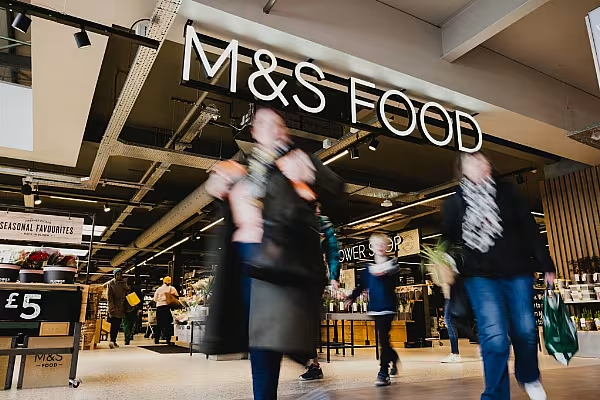Apart from discounter Lidl, Marks & Spencer was Britain's fastest growing supermarket in the Christmas quarter, industry data from NIQ has shown.
NIQ said M&S's food sales on a value basis rose 12.1% in the 12 weeks to December 30 year-on-year, with its share of the UK grocery market rising 0.1 percentage point to 3.8%.
Almost 29% of households shopped at M&S in December, up from 27% in the same period last year, equating to 500,000 new shoppers, it said.
M&S's food shopper numbers always jump at Christmas. Its challenge is to retain them for the rest of the year.
The group, which also sells clothing and homewares, will update on Christmas trading on Thursday.
Discounter Performance
NIQ said Lidl GB's sales over the 12 week period rose 15.3%, while fellow discounter Aldi UK's sales were up 11.4%, increasing their combined market share to 20.1%.
Echoing data from rival market researcher Kantar last week, NIQ said market leader Tesco and No. 2 Sainsbury's also performed robustly with sales up 7.4% and 8.7% respectively, but privately owned Asda and Morrisons were laggards with growth of 3.2%. Kantar's monthly report does not include M&S.
Tesco will also update on Christmas trading on Thursday, a day after Sainsbury's.
Total Sales
NIQ said total supermarket sales in cash terms reached £4.8 billion (€5.58 billion) during the week ending December 23, the biggest week on record and an increase of 4.3% on Christmas 2022. Sales on a volume basis rose 1.2%.
The researcher said confectionery was the highest performing category in December with 17.3% value growth, but value sales for beers, wines and spirits slowed to 1.6% with volumes down.
“With low everyday pricing and loyalty card savings now key strategies across the industry, retailers will need to refocus on how they differentiate and offer other reasons to choose their stores to help sales growth and rebuild store equity," commented Mike Watkins, NIQ’s UK head of retailer and business insight. "Yet promotions will still be important for footfall and sales growth, particularly after two years of falling FMCG volumes due to inflation.”
Separately on Tuesday, data from the British Retail Consortium showed lacklustre overall UK retail sales around Christmas, which may add to concerns that the economy has tipped into a mild recession, less than a year before a likely national election.
Additional reporting by ESM













